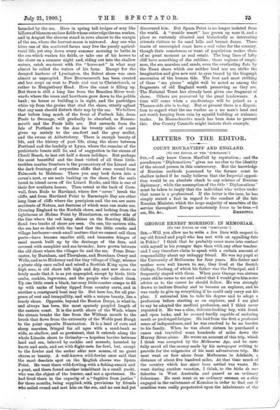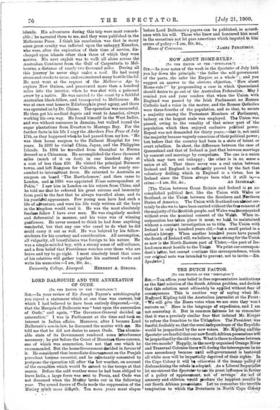GEORGE ERNEST MORRLSON : IN MEMORLLif,.., [TO THE EDITOR Or
THE "SPECTATOR.] ' you allow me to write a few lines with respect to my old friend and pupil who has met with an appalling fate in Pekin? I think that he probably came more into contact with myself in his younger days than with any other teacher, and I may therefore claim to speak with a certain amount of responsibility about my unhappy friend. He was my pupil at the University of Melbourne for four years. His father and mother were well known to me; they lived at the Scotch College, Geelong, of which his father was the Principal, and I frequently stayed with them. When poor George was sixteen years old he came to me and asked that I would give hilasome advice as to the career he should follow. He was strongly drawn to imitate Stanley and to become an explorer, and he was ready to give up everything if he could only carry out his plan. I entreated him to take his degree and to adopt a profession before starting as an explorer, and I am glad to-say he adopted the medical profession, and I think never repented it. He was a slim, delicate-looking boy, with frank and open looks, and he seemed hardly capable of enduring much or prolonged fatigue. He had from the first a profound sense,of independence, and he was resolved to be no burden to his family. When he was about sixteen he purchased a canoe an travelled some hundreds of miles down the Murray Riverolone. He wrote an account of this trip, which I think was accepted by the Melbourne Age, and he care- fully saved all the money made by his newspaper writing to provide for the exigencies of his next adventurous trip. He next went on foot -alone from Melbourne to Adelaide, a distance of about five hundred miles. At that time much of the country which has since been settled was waste. He went during another vacation, I think, to the Liebe de vier fisheries in West Australia and passed as an ordinary fisherman. He next went as an ordinary seaman on a ship engaged in the enlistment of Betakes in order to find out if cruelties were really perpetrated upon the inhabitants of the islands. His adventures during this trip were most remark- able ;. he narrated them to me, and they were published in. the Melbourne Press. I think his conclusion was that in many cases great cruelty was inflicted upon the unhappy Kanakas, who were, after the expiration of their time of service, dis- charged upon islands other than. those Of which they were natives. His next exploit was to walk. all alone across the Australian Continent from the Gulf of . Carpentaria to Mel- bourne, a distance of nearly two thousand miles. During all this journey he never slept under. a roof. He had many rivers and creeks to cross, and eneountered many hostile blacks': He next went at the request of the Melbourne Age to explore, New Guinea, and penetrated raore than a hundred miles into', the interior, when he was shot with a poisoned arrow by a native. He was carried to the coast by a faithful Australian black-fellow, and transported to Melbourne. He was at once sent home to Edinburghin great agony, and there was operated on by Dr. Chiene. The operation was successful. He then got his medical degree and went to America, always working his own way. He found himself In the West Indies, and was without resources in Jamaica, but 'walked 'round the sugar plantations from Ewarton to Montego Bay. For the further facts in his life loopy the Aberdeen Free Fress of July 17th, as they happened when he had passed from, my ken. " He was then* house surgeon to the Ballarat Hospital for two years. In 1893 he visited China, Japan, and the Philippine Islands. In 1894 he travelled from Shanghai to Burma dressed as a Chinaman. He accomplished the three thousand miles (much of it on foot) in one hundred days at a cost of less than 220. He visited the principal Burmese towns, and left Rangoon for Calcutta, where he nearly sue- cambed to intermittent fever. He returned to Australia as surgeon on board 'The Bartholomew,' and then came to London, and in 1895 was appointed Times correspondent at Pekin." I saw him in London on his return from China, and he told me that he referred his great success and immunity from peril to the fact that he always travelled alone, and to his youthful appearance. Few young men have had such a life of adventure, and were his life truly written all the boys in the kingdom would read it. He was the most absolutely fearless fellow I have ever seen. 'He was singularly modest and deferential in manner, and his voice was of winning gentleness. He never seemed to think he had done anything wonderful, but that any one who cared to do what he did could carry it out as well. He was helOved by his fellow. students for his courtesy and consideration. All assumption, all vulgarity, all boastfulness was foreign to his nature. He was a simple-minded boy, with a strong sense of self-reliance, and a firm belief that Providence watches over those who, are brave and try to go right. I most sincerely trust that some of his relatives will gather together his scattered works and write his memories.—I am, Sir, &c., University College, Liverpool. HERBERT A. STRONG.



































 Previous page
Previous page